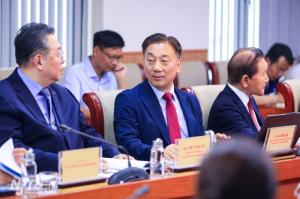Vietnam–Korea Blockchain Cooperation Advances Digital Economy Partnership
Vietnam and Korea strengthen blockchain collaboration to drive digital transformation, RWA tracking, and industrial innovation across Southeast Asia.
The Korean delegation included blockchain expert Dr. Na Jeong-sik, along with former Ministers Heo Sin-haeng and Gwon Do-yeop, Director Jang Kwang-sik of the National Strategy Planning Institute, Professor Song Kwan-bae, Chairperson Son Ha-eun of BioBomb Together, and KHI CEO Kim Kyung-hyo.
Dr. Na, who has visited Vietnam eight times over the past few years to assess blockchain’s practical potential on-site, described the seminar as “a pivot point aligning policy, industry, and diplomacy.”
Core topics included real-world asset (RWA) tracking, supply chain transparency in agriculture, consumer protection, data governance, and digital twin modeling. A shared commitment emerged to move beyond theory into pilot implementations.
Though only a luncheon was originally scheduled, Vietnam’s Department of Science, Technology, and Digital Innovation hosted an impromptu dinner banquet for the Korean delegation—a rare diplomatic gesture that underscored the meeting’s strategic value. “The hospitality was highly unusual and signaled deep interest from Vietnamese leadership,” said Dr. Na.
Beyond the seminar, six-hour-long private business talks were held with major Vietnamese entities including VN Group, VN Pay, and state-run Song Hung Construction, discussing blockchain integration in payment infrastructure, enterprise systems, and platform investments. This marked a shift from policy dialogue to actionable industrial cooperation.
The following day, the Central Policy and Strategy Committee issued an official letter of appreciation, expressing commitment to regular dialogues, expert consultations, and joint initiatives. Meanwhile, Vietnam’s Sonha Group proposed collaboration on blockchain-based coin issuance, a new exchange, and a dedicated platform—with Da Nang under consideration as a pilot city for regulated blockchain operations.
Vietnam’s policy shift is also gaining momentum. Starting January 1, 2026, the country will fully open its regulatory framework for blockchain. In late August, Da Nang will host its first “National Blockchain Day,” signaling a unified push from legislation to industrial application.
A follow-up Korea–Vietnam seminar is planned for late September or early October at the Korean National Assembly, gathering approximately 20 policy leaders from both sides and up to 300 general attendees. Preparations for that event are underway, with Dr. Na returning to Vietnam next week to finalize the agenda.
The recent state visit of Vietnamese Communist Party Secretary General To Lam reinforced this direction. In his meeting with President Lee Jae-myung, digital transformation emerged as a central item alongside nuclear energy, high-speed rail, and smart city development. President Lee expressed Korea’s readiness to contribute advanced technologies to Vietnam’s national infrastructure and pledged deepened cooperation in multilateral platforms such as APEC and the United Nations.
Dr. Na, who previously served as chairman of the Korea Blockchain Coordination Association and senior researcher on crypto finance policy in the National Assembly, emphasized that blockchain is not merely a technological trend but a “strategic platform” for emerging economies. His advisory work has extended to Cambodia, Brazil, and soon, Vietnam’s government for regulatory system design and exchange establishment.
As media coverage spreads, additional requests for regional conferences have come from countries such as Indonesia, India, Myanmar, Laos, Turkey, and Cambodia, reflecting a rising trend of blockchain diplomacy.
Southeast Asia’s young demographic—Vietnam’s median age is 35—has become a powerful force for agile digital adoption. “Compared to developed economies, countries like Vietnam are moving faster because the public is already deeply engaged in crypto and blockchain use,” Dr. Na said.
He highlighted data trust, regulatory clarity, and execution speed as critical enablers of success. Korea, he noted, is already integrating blockchain into social infrastructure, including its public subsidy programs, and sees strong synergy in working with Vietnam as a regional partner.
Dr. Na also pointed to K-culture as an area of untapped blockchain potential. By linking ticketing, NFTs, and metaverse platforms to cultural exports, Korea could reclaim global leadership in digital innovation.
“Digital transformation is no longer an option,” he added. “Korea and Vietnam together are shaping a model that blends culture, industry, and technology.”
Bradley Park
Aura Univ
email us here
Visit us on social media:
LinkedIn
Legal Disclaimer:
EIN Presswire provides this news content "as is" without warranty of any kind. We do not accept any responsibility or liability for the accuracy, content, images, videos, licenses, completeness, legality, or reliability of the information contained in this article. If you have any complaints or copyright issues related to this article, kindly contact the author above.
Tamara Rivera to Join 2025 Manila Book Fair with Three Memoirs That Speak to Truth, Healing, and Identity
WRB Exteriors Launches New Website – Premier Siding Contractor Serving Sacramento, Bay Area, and Lake Tahoe
XXIV Launches New twentyfour skincare Brand Featuring Two Patented Technologies
Więcej ważnych informacji
 Jedynka Newserii
Jedynka Newserii

 Jedynka Newserii
Jedynka Newserii

Finanse

K. Gawkowski: Polska w cyfrowej transformacji gospodarki awansowała do pierwszej ligi w Europie. 2,8 mld zł z KPO jeszcze ten proces przyspieszy
Uruchomiony na początku lipca przez Ministerstwo Cyfryzacji i BGK program „KPO: Pożyczka na cyfryzację” cieszy się dużym zainteresowaniem. Samorządy, uczelnie oraz firmy mogą wnioskować o wsparcie finansowe dla inwestycji w transformację cyfrową, m.in. modernizację infrastruktury czy cyberbezpieczeństwo. W sumie na ten cel trafi 2,8 mld zł (650 mln euro). Ze względu na krótki czas naboru obie instytucje organizują w poszczególnych województwach warsztaty dla wnioskodawców, które mają rozwiać ich wątpliwości przy przygotowywaniu wniosków.
Prawo
Koszty certyfikacji wyrobów medycznych sięgają milionów euro. Pacjenci mogą stracić dostęp do wyrobów ratujących życie

Od 2027 roku wszystkie firmy produkujące wyroby medyczne w Unii Europejskiej będą musiały posiadać certyfikat zgodności z rozporządzeniem MDR (Medical Devices Regulation). Nowe przepisy wprowadzają dużo ostrzejsze wymagania w zakresie dokumentacji, badań klinicznych oraz procedur certyfikacyjnych. Branża ostrzega, że część małych i średnich producentów nie zdąży się dostosować. Problemem jest także wysoki koszt i długi czas uzyskiwania certyfikatów. W konsekwencji z rynku mogą zniknąć urządzenia ratujące życie.
Infrastruktura
Nowe przepisy o ochronie ludności cywilnej wprowadzają obowiązkowe elastyczne zbiorniki na wodę. Mają one służyć w razie suszy, pożarów czy wybuchu wojny

Samorządy będą musiały posiadać m.in. elastyczne zbiorniki na wodę pitną i przenośne magazyny wody przeciwpożarowej. To element odpowiedniego przygotowania zasobów na wypadek sytuacji kryzysowych, kataklizmów czy wybuchu konfliktu, wprowadzony nowymi przepisami o ochronie ludności. Eksperci podkreślają, że tego typu rozwiązania to innowacyjne produkty, które nie tylko ułatwiają logistykę w sytuacjach kryzysowych, ale także mogą znacząco skrócić czas reakcji służb ratunkowych.
Partner serwisu
Szkolenia

Akademia Newserii
Akademia Newserii to projekt, w ramach którego najlepsi polscy dziennikarze biznesowi, giełdowi oraz lifestylowi, a także szkoleniowcy z wieloletnim doświadczeniem dzielą się swoją wiedzą nt. pracy z mediami.








.gif)

 |
| |
| |
|